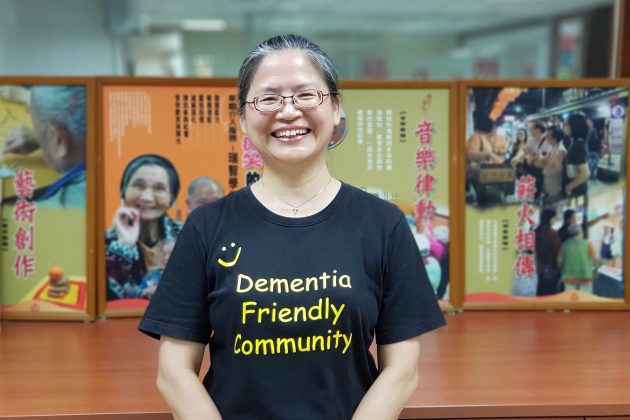
▲ LiYu Tang, secretary-general of Taiwan Alzheimer’s Disease Association, claims that the Taiwan Dementia Plan 2.0 will enhance the human rights of people with dementia. (CNEWS information photo / reporter Hu Chao-hsin)
CNEWS reporter Chen Yu-kai / Taipei report
The Ministry of Health and Welfare unveiled the new version of its Dementia Plan and announced the goal of achieving a dementia-friendly Taiwan by 2025. Since the Taiwan Dementia Plan 2.0 was drafted, people with dementia and their families have been invited to contribute for the first time. Experts and teams in the field of dementia and research have also expressed their support for the policy which is considered a big step forward for the rights of the people with dementia while responding to the real needs of families. Still, questions like “where does the funding come from?” “How to implement this policy?” are the next important steps to be implemented.
After 28 years of research and service on dementia, LiYu Tang, secretary-general of the Taiwan Alzheimer’s Disease Association and full member of the World Dementia Council, praises the government. She remarked that the recommendations of the World Health Organization’s (WHO) Global Action Plan on the Public Health Response to Dementia have been integrated in Taiwan Dementia Plan 2.0. The new policy also responds to the needs of people with dementia and their families while being in line with international standards.
The most important breakthrough in the Taiwan Dementia Plan 2.0 is in the planning though. This is the first time that people with dementia and their families have voiced their support for President Tsai Ing-wen’s commitment to the rights of people with dementia.
LiYu Tang said that since Taiwan Alzheimer’s Disease Association unveiled the first draft of the Dementia Policy in 2013, Taiwan has since become the 13th country with such policy. As many as 70 percent of people do not know about the policy even though many people have been diagnosed. They do not know where the services and resources are. This could change with the Taiwan Dementia Plan 2.0.
Another highly expected feature is the creation of “Integrated Dementia Care Center (IDCC).” To Dr. Tsuann Kuo, President of Taiwan Association of Family Caregivers (TAFC) and an assistant professor of the Department of Medical Social and Social Work at Chung Shan Medical University, this initiative will become one of the 17 services of the Ten-Year Long-Term Care Plan 2.0 for the patients. In the past, the biggest challenge for caregivers in a state of physical and mental exhaustion was to find someone to help.
Physicians are not omnipotent, social workers do not have three heads and six arms, so Dr. Tsuann Kuo expects all professions to cooperate hand in hand and assist caregiver in their hard work. Since asking for assistant could be the most difficult step, let the IDCC staff guide the families after people with dementia are diagnosed, find their needs and refer to appropriate services.
Dr. Ming-Jang Chiu, director of the Department of Neurology at National Taiwan University Hospital, recommended that the Ministry of Health and Welfare steps up the pace [of reform] and not allow the IDCC to stay in the current “trial” stage. By giving a comprehensive access to the system, hospitals should no longer be able to choose whether they want to participate or not, but [be compelled] to do so.
Still money and people will put Taiwan Dementia Plan 2.0 to the test, just like Ten-Year Long-Term Care Plan 2.0 did. LiYu Tang said that the IDCC, Support Center for People with Dementia and their Families(SPDF), risk reduction projects and dementia-friendly community projects will share NT$1.3 billion in funding, the largest in history, with an overall program is clearly listed. Experts are still looking forward for the policy to be implemented successfully.
SEE ALSO:
‘Abduction’ effect of dementia to impact millions within 20 years
About 10,000 young people with dementia have been forgotten by long-term care services, haven’t they?
Photo source: CNEWS file photo / photo reporter Hu Chao-hsin
[For article reprint, please indicate the source]
延伸閱讀
About 10,000 young people with dementia have been forgotten by long-term care services, haven’t they?
- 2018-07-20
- 陳 鈞凱
Taiwan’s 270,000 people with symptoms of dementia are fool, aren’t they? Concepts need to be reversed
- 2018-07-20
- 陳 鈞凱
‘Abduction’ effect of dementia to impact millions within 20 years
- 2018-07-20
- 陳 鈞凱
